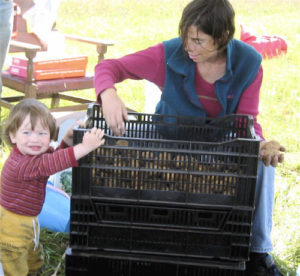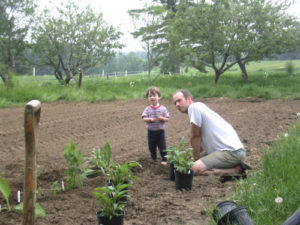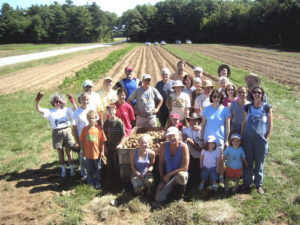 |
| Griffin and Maura sort potatoes. Photo by Seth Kroeck. |
By Marada Cook
Copyright ©2006 by the author
The concept of “socializing kids into farming” competes with a process of “externalizing” farm families and communities that has been happening in New England since the 1800s. Crystal Spring Community Farm in Brunswick, Maine, may be inverting these trends.
Crystal Spring is owned by the 900-member Brunswick-Topsham Land Trust and is providing a way for young people to start farming, or be part of a farm, on the remaining open space in the area. The farm supports a 200-member CSA and a Saturday farmers’ market (held on a different day from the Brunswick Common market).
Ideals of “the family working together,” “living on the farm” and “commitment to a piece of land over several generations” resonate with six of the families I interviewed who converge around Crystal Spring Community Farm; but at the same time, no family or farm exactly fits a stereotype.
Crystal Spring Farmers Balance Kids, Jobs
Seth and Maura Kroeck are the farmers for the CSA at Crystal Spring Farm—and they’re raising two young children there. How do they do it?
“Meal times can be hectic,” Seth admits. “With two kids, one still nursing, it’s hard to get all four of us sitting at the same time.” Kroeck, in his second season of farming Crystal Spring, finds that his crops are easier to tend in the field than his kids are. “We expected [two-year-old] Griffin would be able to tag along and help out,” his wife Maura laughs, “but that wasn’t exactly the case. Basically, he would undo everything.” Their second child, Leila (seven months old), will be this summer’s baby, and Seth wonders “how exactly it will all pan out.”
Seth and Maura hope that Griffin and Leila will get the kind of farm experience that “keeps things fun, without becoming a place of obligation or alienation.”
“As long as we kept a close eye on him,” adds Maura.
 |
| Griffin and Seth work in the family garden. Photo courtesy of Crystal Spring Farm. |
Their son Griffin is noted on and off the farm. “We’ll be in the store, and someone will point him out and say, ‘There’s Griffin, he’s that farm kid,’” says Maura. In an other era, in a town less liberal and affluent, the comment might have been taken differently, but in Brunswick, whose out-of-state retirees and young parents alike are thrilled to have a “real farm” just a mile from Bowdoin College, being a “farm kid” is becoming the ultimate in community prestige. “We’re hoping Griffin will get that from his peers–you know, ‘You’re so cool, you live on a farm’–that kind of thing,” Maura adds.
“The Land Trust really wanted a farmer to work Crystal Spring Farm,” Seth notes. “We seemed to fill a stereotypical ideal of what the family farm should be.”
“There’s a certain amount of re-education that has been going on about that, I think,” adds Maura.
“Maura works off the farm, Griffin goes to day-care three days a week,” Seth continues, explaining how they may not follow preconceived notions of how a farm family functions, and how they are dealing with the logistics of farming and parenting, like other young working parents around the state. Despite diverse schedules and the demands of young children, the family still manages to eat together about half the time in the summer.
Customers “Own” the Farm
Kate and two-year-old Maddie Egan are shareholders in Crystal Spring Community Farm, and they frequent the U-Pick crops there. “We were really ignorant about what Maine would be like,” writer Kate Egan says, “We thought everyone would be eating lobster or at least seafood every day.” Adopting Crystal Spring CSA has been “truly the highlight” of their move to Brunswick. Egan, whose Brooklyn, New York, shopping trips included the Prospect Park Farmers’ Market, has always emphasized fresh produce and family meals, but says coming to Maine “really changed the way we think about food.” Challenges now include not pickpockets and point-of-purchase freshness, but scheduling multiple trips each week to the U-Pick field and strategizing to eat a half-share’s worth of vegetables before the next week’s pick-up.
For the Egans the “family farm” doesn’t “belong” just to Seth, Maura, Griffin and Leila; their three-year-old daughter Maddie has taken ownership as well. When relatives come from New York, Maddie is the one who shows them the sheep, the strawberries and “her” dog – which conveniently lives at “her” farm.
Friends with Kids Create Community
Jeff and Amy Burchstead of Buckwheat Blossom Farm in Wiscasset are friends and farming colleagues of the Kroecks—and young parents, as well. “I know we’re going to say something really idealistic now,” Jeff laughs, “and then every farmer in the state will laugh at us down the road.” The parents hope that their seven-week-old daughter, Ruth Elana, will grow up “with chores and participation in the farm.” They also hope that Amy’s mother will move onto their land in the next five or six years. “The family is supposed to be the heart of America’s pioneering spirit,” Jeff says, adding, “Our idea is: We’ll send the kids off to Grandma’s house when we need to.”
The Burchsteads look to the Kroecks for examples of parenting on the farm, and the bond that the couples share is forming the kind of community that many farm parents wish they had had when their kids were young. Like any other parents, these farmers find getting out the door challenging in mid-January – their “farming with kids” brunch has to be rescheduled three times due to bad weather, sick kids and prior commitments.
Shared Meals Foster the Next Generation
Fourteen-year-old Jeremy Colson of New Leaf Farm in Durham, Maine, is a vendor at the Crystal Spring Farmers’ Market.
“He’s got algebra homework right now,” says Chris Colson, certain that her son has at least one ear tuned in to the phone, “but I can tell you right now, he had much more fun with math at the market this summer.”
Jeremy has been growing his own vegetable plot at New Leaf Farm since he was eight, and this year’s cut flowers earned him $40 per market while his patch lasted. “It was his first sales experience,” says Colson, whose daughter Robin and son-in-law Steve also work for the farm, “and although I think he spent a fair amount of his earnings on food at the market, he learned the joy of receiving money – and compliments.”
Chris Colson’s experiences with the family farm (New Leaf Farm is her husband Dave’s family farm) have a lot to do with her own sense of nurturing – distinct from that of plant and animal husbandry. Although she and Dave pay their children to work on the farm, Chris’ preferred rewards come in other forms. Her two-year-old granddaughter, Maggie, begs for Chris to host “Farm Dinners” – the one day a week when Dave, Chris, Jeremy, Steve, Robin, Magnolia and the farm interns all eat together. “This is the key to the farm experience,” Colson says, “The kids are inundated with our conversations about food, politics and food politics – it’s the best thing we’ve done throughout the years.”
Sheep Sharing
Farmer Tom Settlemier, 68, is a partner in “Crystal Spring Farm Katahdins.” When he and his wife, Marilyn (now deceased), moved to Brunswick for Tom’s teaching position at Bowdoin College, the biochemist bought nearby Settlemier Farm for the kids, sheep, contentment and the work he had grown up doing in Ohio. “We thought of it as a better, healthier way of living,” he explains, adding, “My kids may have felt they were missing out on late nights in town, but I remember there was always a continual stream of friends coming to help on the farm – and for meals.”
With his kids grown and pursuing lives of their own, Settlemier has turned his attention to Crystal Spring Farm. He was one of three members of the Brunswick-Topsham Land Trust who signed for $700,000 to buy the land and farm buildings. He then spent three years helping raise funds for the farm. The farmers’ market where Jeremy Colson sells his flowers was Tom’s idea, and the “Crystal Spring Katahdins” are the legacy of 30 years of the Settlemier’s family farm – 100 sheep now held equally between Seth Kroeck and Settlemier.
“Last summer I moved the herd to Crystal Spring Farm. It’s a partnership that has worked well for both of us.” Settlemier sat on the board that leased the farm to the Kroecks, and as Seth describes it, “Having a young family like ours to work the land was the ‘icing on the cake’ for the Land Trust.”
Marrying off his herd is not Settlemier’s only priority. He describes efforts by the Land Trust to purchase blueberry barrens near the high school, and land on the other side of Pleasant Street. “All-in-all, it would make a contiguous, 400-acre parcel of land that would belong to members of the Land Trust. And the members of the Land Trust, Crystal Spring Farm CSA, and the Farmers’ Market all think of the place as theirs.”
Although he says he can’t speak officially for the entire trust, Settlemier’s ultimate goal is to set other young farmers up on the farmland remaining in Brunswick. “We have a certain open-ended attitude about the possibilities that are out there,” he says.
CSA Members and Schoolmates
Sarah Ackerling and Jay and Aiden Treutel are Crystal Spring shareholders. Jay is also a house dad, and Aiden and Griffin are schoolmates–and future organic farmers? Jay is the one who usually goes to the farm with Aidan, and the one who does all the cooking. Sarah “introduced me to this whole thing with organics – and I kind of grew into it.”
Jay gets home from work before his wife, a naturopathic doctor. Although the family eats out “about once a week – at O’Naturals or Christina’s,” on most Fridays Jay picks Aidan up from day care and the two of them decide on the supper menu while picking up the CSA share. They eat organic foods when possible and grow a small garden. “We feel the effort pays off in the long run,” Jay says.
While Aiden Treutel and Griffin Kroeck may not yet recognize the benefits of being farm-oriented peers, their parents appreciate the holistic health plan.
“Going to the farm is a real social thing,” Sarah says, “He knows Seth is ‘his’ farmer, and that is where we get our food from.” Maura says similarly that Griffin loves to “just goof off for the shareholders.”
 |
| Members of the Crystal Spring Community Farm CSA. Photo by Seth Kroeck. |
Jay hopes the agricultural enthusiasm will rub off. “I’m really hoping my son will have his own little garden and he can go the course of the seasons – perhaps even work on the farm some day.”
Treutel’s sentiment echoes a larger force at work around the Crystal Spring community–the idea that the land is being held not just in legal and conservation trust, but for the families surrounding the farm as well. Like its creation, the inheritance of this farm will not be straightforward. Seth and Maura Kroeck, Jeff and Amy Burchstead, Chris Colson and Tom Settlemier all say they don’t want their kids limited to or forced into farming. Whether Griffin and Leila decide to stay on the farm may be a less critical question than what the “new” family farm is going to look like.
In a community that raises its CSA and farmers’ market customers to have the same values as its children, and on a piece of land that belongs to a larger definition of family, the next organic farmers could come from either side of the share room.
About the author: Marada Cook grew up on a farm in Maine and was a student at Hampshire College in Amherst, Massachusetts, where her Division III project was “Bringing it Home: Food, Farming, and Rural Revitalization in Aroostook County, Maine.”
